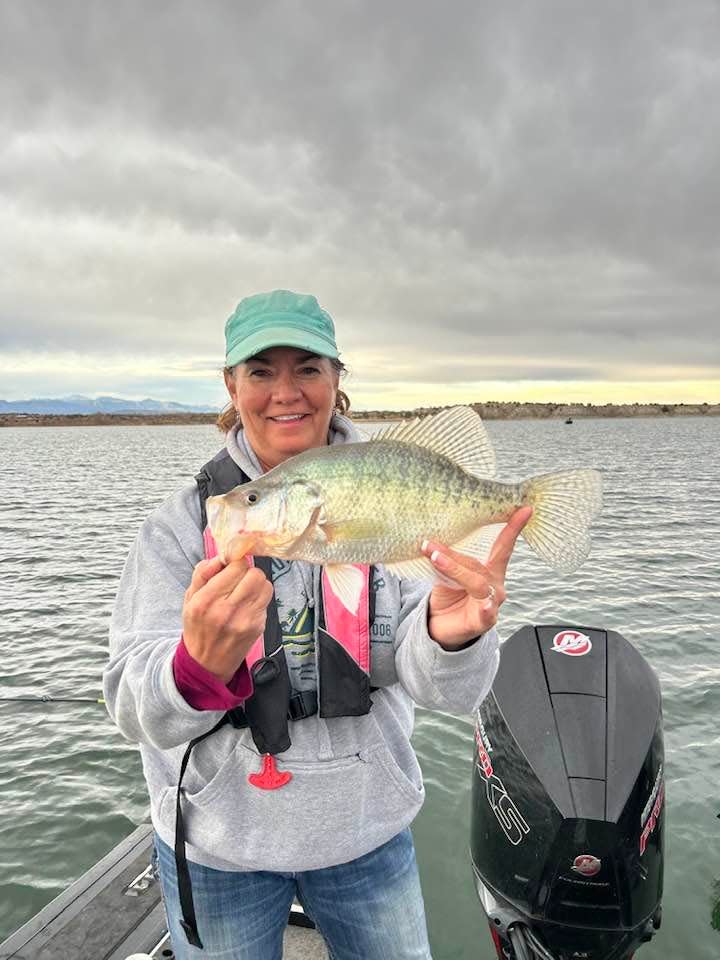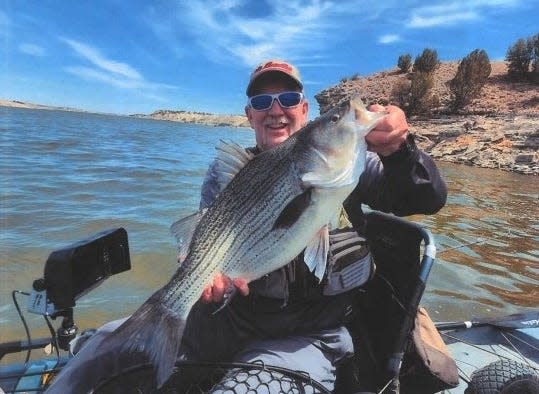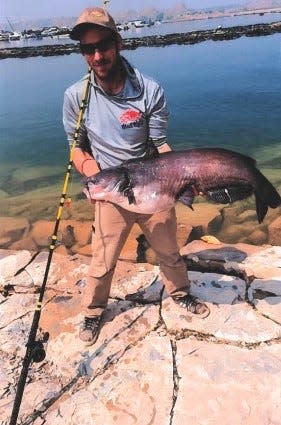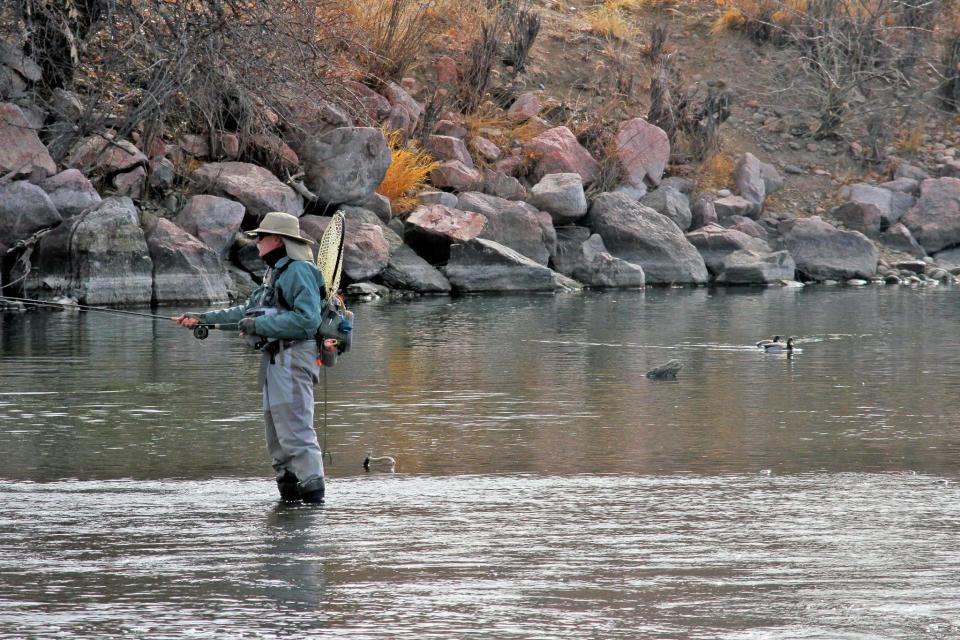On a trip to the Pueblo Reservoir in November 2023, Westcliffe resident and avid angler Pam Mitzner was on a boat with a rod in her hand, fishing for crappie deep in the lake when she felt a lunker on the line.
Mitzner said it didn’t take long for her to realize it was a “pretty good-sized fish.”
Her husband, Mike Mitzner, had caught a colossal crappie of his own the day prior — the couple tends to be pretty competitive about their fishing exploits, and Mike maintains his crappie was bigger than Pam’s catch the day after — so they’d already looked up the Colorado record length for a crappie.
So when Pam caught her crappie the next day, they quickly confirmed the fish she’d caught was not only large but a new state record of 15.75 inches.
“It was obvious that it was a nice crappie because we catch lots to keep … and to harvest (a crappie) in the reservoir, they have to be 10 inches or greater. So for it to be, you know, half-again bigger, we knew it was a pretty good-sized fish,” Mitzner said.
“With crappie, you use lighter-weight poles. So, to bring in a big fish on a light pole is fun because you really have to work to get it.”

Once they measured the fish on their boat and snapped a photo, the Mitzners had to approach another boat about a half-mile away to have them confirm the measurement and witness the crappie being returned to the lake alive — both requirements for catching record-length fish in Colorado.
They then sent the proper documentation to Colorado Parks and Wildlife officials, who confirmed the record and added Pam’s name to the list of anglers who’ve caught record-setting fish across the state.
A taxidermized replica of the crappie is now displayed in Mike’s shop at the couple’s home alongside the state’s certificate.
Mitzner’s catch is just one of seven record-setters that have been caught in the Pueblo area, all of which were caught either at the reservoir or nearby Valco Ponds.
“Pueblo, for fishing, has been a sleeper lake,” Mitzner said. “Not many people realize the variety of fish and the quality of fishing that’s available down there. It’s just a great little place to fish. I know a lot of people take advantage of it for jet boating and wakeboarding and all that stuff they do out there, but I think it gets overlooked by a lot of fishermen.”
What state fishing records have been set in Pueblo?
According to CPW records, seven record-setting fish have been caught in Pueblo — five at the reservoir and two at Valco Ponds.
The state separates fishing records by length and weight of fish, and four of the records set locally, including Mitzner’s, were by length, with the other three determined by weight.
All of the record fish were caught in the past 20 years, and five were caught in the past five years.
More on Lake Pueblo: Your 2024 guide of things to do at Lake Pueblo State Park this spring and summer
Here are the record fish that have been caught in Pueblo:


By length
-
Colten Smith, channel catfish, length of 39.5 inches, caught in 2021 at the Pueblo Reservoir
-
Gary Nussbaum II, wiper, length of 28.5 inches, caught in 2023 at the Pueblo Reservoir
-
Pam Mitzner, white crappie, length of 15.75 inches, caught in 2023 at the Pueblo Reservoir
-
Corey Ricker, smallmouth bass, 22 inches, caught in 2024 at Valco Ponds


By weight
-
Kevin Treanor, wiper, 26.94 pounds, caught in 2004 at the Pueblo Reservoir
-
Michael Hardin, spotted bass, 4.49 pounds, caught in 2005 at Valco Ponds
-
Coy Bowyer, blue catfish, 33.53 pounds, caught in 2023 at the Pueblo Reservoir


What makes Pueblo ideal for catching big fish?
Carrie Tucker, a CPW aquatic biologist, said Pueblo has several ample angling opportunities between Valco Ponds, the Arkansas River, and the Pueblo Reservoir, which has “one of the most diverse fish assemblages in Colorado.”
Contributing to the diversity and size of the fish in the reservoir and throughout the area is Pueblo’s mild climate, which allows anglers to visit some of Pueblo’s fishing hotspots year-round, as well as its robust food sources for fish, and stable water levels at the reservoir in recent years.
“Having those higher water levels and all that habitat inundated with water definitely helps with the survival of those young fish to recruit to the adult population,” Tucker said. “And also, we have a longer growing season than some of the other reservoirs in the state.”
“Since we have such mild climate, we ice off pretty early compared to other reservoirs, and we stay warm later. That allows the fish to really grow throughout the year more than they would in other systems around the state,” Tucker explained.
Tucker said Pueblo also has a great forage base, which provides lots of food for the species that call the reservoir home.
“We’ve been blessed with a strong, healthy gizzard shad population, and that feeds most of the fish in the reservoir,” she said. “So that provides food year-round, even for some of the more voracious predators that we have in the reservoir.”


Tips for catching your own Colorado record-setter
Generally speaking, Tucker said anglers seeking to catch big and potentially record-setting fish in the Pueblo area should try fishing in places where there may be fewer fish overall, but that provide better conditions for large ones.
“Be patient and maybe fish areas that you normally wouldn’t fish, because those bigger fish are not going to want to stick around with the smaller fish in large groups,” Tucker said. “A lot of them tend to be more solitary the bigger they get because they need more resources.
“So if they’re sticking close with the smaller fish, there’s more competition. For walleye in particular, they like to go deep in the summer and seek refuge. And also, the bigger fish don’t have to eat as often as the smaller fish,” Tucker said.
“So I would say be patient and try to focus on areas that you might not consider if you were just trying to catch a fish,” she advised.
Mitzner said patience was also a factor in catching her state-record crappie last year, as retrieving a fish from deep water poses its own challenges, especially when one requirement for a state record by length is that the fish is returned to the water alive.
“Where we caught him and the time of year that we caught him, he was down very deep. And one of the things you have to be really careful with when you’re bringing any fish out of deep water is … that you have to bring them up slowly so that they don’t get barotrauma, which is what happens when divers go down deep into the ocean and come up too fast, they get the bends. It goes with the change in the pressure and oxygen levels,” Mitzner said.
“So anyway, you have to protect them from getting barotrauma so that you can release them,” she said.
As is the case with any fishing outing, persistence is also key.
“One of the biggest things that I’ve heard from anglers over time is that they get frustrated if they don’t catch fish. And so a lot of people will say that there is no fish in the reservoir just because they can’t catch the fish, but that’s not necessarily true,” Tucker said.
“We’ve proven that over and over again during our sampling, especially on the river. So a perceived decline in catching fish doesn’t necessarily mean that the fish aren’t there and the fish aren’t healthy,” Tucker said.
“In the summer months when the water temperature increases, the fish can become less active. When there’s abundant food, they don’t need to eat as often or they’re smart enough to know the difference between a lure that someone’s thrown out and a live fish,” she said.
“So fishing can be frustrating, but if you are persistent you can definitely be successful.”
More on Colorado wildlife: Colorado hummingbirds are headed south for their winter migration. Here’s what to know
Chieftain Editor Zach Hillstrom can be reached at zhillstrom@gannett.com, or on X, at @ZachHillstrom. Support local news, subscribe to the Pueblo Chieftain at subscribe.chieftain.com.
This article originally appeared on The Pueblo Chieftain: These 7 Colorado fishing records were all set in Pueblo
